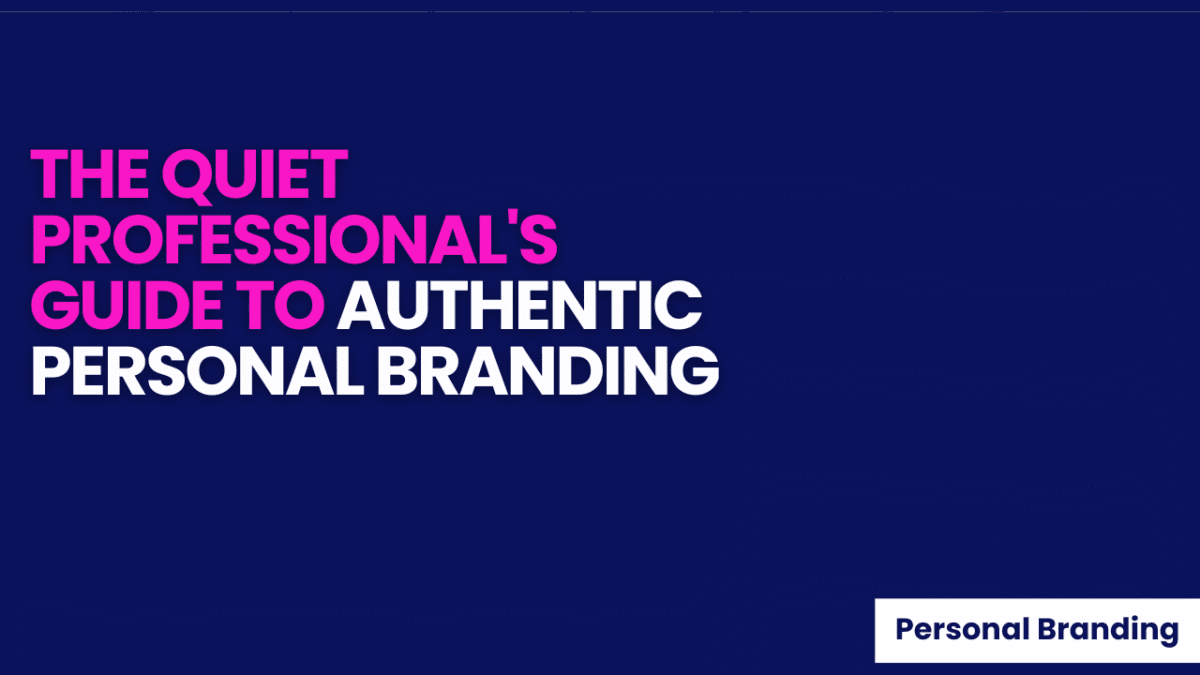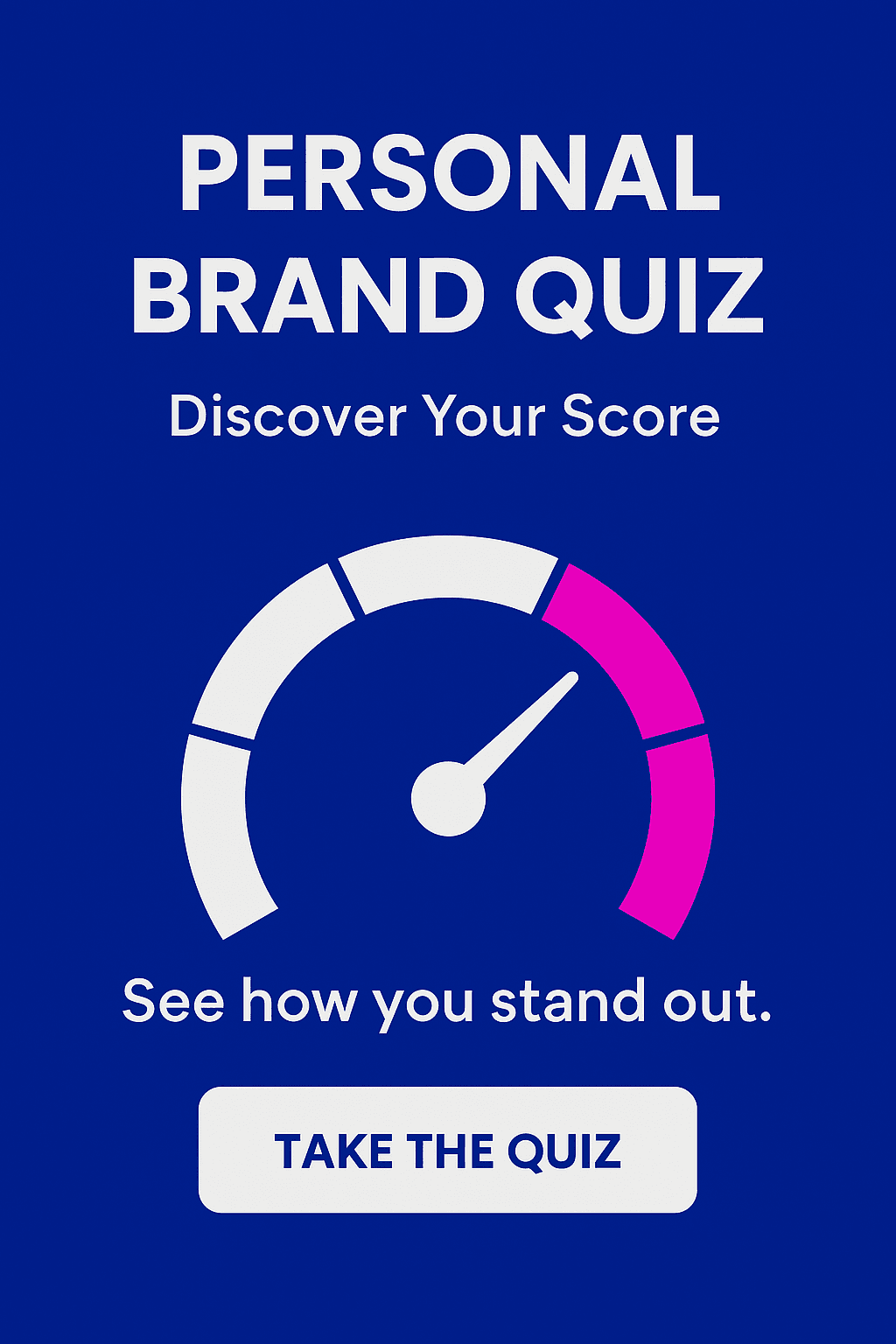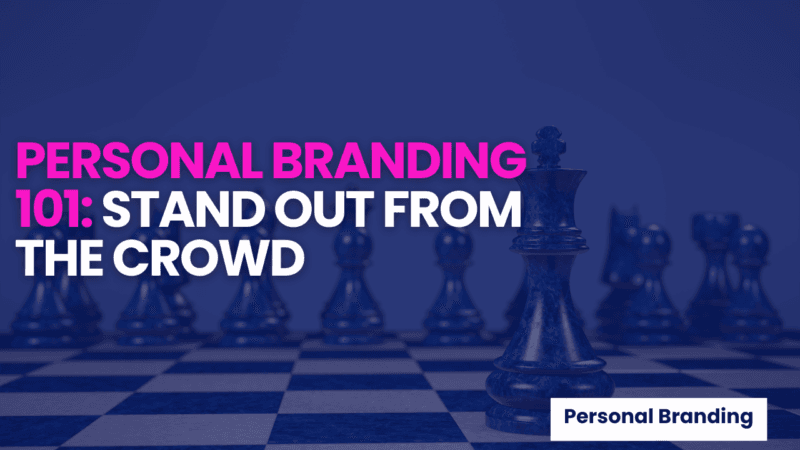
You don’t need to be the loudest voice in the room to be heard online.
Welcome to The Quiet Professional’s Guide to Authentic Personal Branding.
If you’ve ever felt that personal branding wasn’t for you because you’re not “extroverted enough,” you’re not alone. The good news? That’s a misconception, not a limitation.
Personal branding isn’t about performing. It’s about strategic visibility that honours who you truly are.
The Myth That Limits Authentic Connection
The biggest misconception about personal branding is that you need to be a large influencer or C-suite executive to matter.
It’s not. Personal branding is for everyone. It’s about showing your unique perspective and values, not about being the loudest in the room.
According to research, 88% of consumers say authenticity is crucial when deciding which brands they like and support, suggesting that genuine expression matters more than performance.
When quieter professionals realise that personal branding doesn’t mean “performing,” they start to see its power.
If you’ve ever thought, “I’m not extroverted enough for this,” you’re exactly who The Quiet Professional’s Guide to Authentic Personal Branding is for.
Transforming “Showing Up” from Performance to Strategy
One client came to me feeling overwhelmed by the pressure to post every day. They thought that was the only way to be visible.
Together, we shifted the focus to being authentic and sharing their real story, not just posting for the sake of it.
We used the Ikigai methodology as a guide: reflecting on what they love, what they’re good at, what the world needs, and how they can contribute.
By aligning their posts with these core elements, they built a consistent, credible online presence without being “performative” or inauthentic.
We transformed thier approach and made it about quality over quantity. Sharing meaningful updates that truly resonated with their audience.
The Three Pillars of Quiet Visibility
Clarity
For quieter professionals, clarity means knowing exactly what you stand for and how you want to show up.
It’s not about trying to fit into a template or mimic louder voices.
It’s about identifying the core themes you care about, the values you want to highlight, and how you can best serve your audience.
When you have that clarity, it removes the pressure to constantly prove yourself.
Consistency
Consistency doesn’t mean posting daily for the sake of it.
For quieter professionals, it’s about showing up in a way that feels true and sustainable.
Whether that’s sharing one thoughtful article a month, a short video update, or commenting on industry topics.
It’s the steady drumbeat of sharing insights and staying visible, without feeling forced.
Confidence
This is often the missing piece.
Confidence for quieter professionals is about trusting that your perspective matters, even if it’s not the loudest in the room.
It’s about believing that your approach, reflective, considered, and authentic, is just as powerful as any polished, extroverted brand.
And it grows as you see small wins and realise you don’t have to change who you are.
Listening is such an undervalued superpower, especially in a world that’s so noisy. For quieter professionals, it can be a real differentiator.

Listening: Your Secret Weapon in a Noisy World
Listening is such an undervalued superpower, especially in a world that’s so noisy.
For quieter professionals, it can be a real differentiator.
When you really listen to colleagues, clients, or industry conversations, you pick up on subtle cues and insights that others might miss.
In a study of more than 900 CEOs, by the Columbia Montour Chamber of Commerce, it was the introverted personalities that impressed investors most, challenging the myth that effective personal branding requires extroversion.
In terms of personal branding, this translates into thoughtful posts and commentary that cut through the noise.
Instead of jumping into the conversation just to be seen, you’re adding genuinely useful, considered perspectives.
People notice that and come to trust you as someone who sees beyond the headlines.
On a practical level, you can share what you’ve learned from these conversations – insights you’ve gathered or even patterns you’re noticing.
That’s authentic, valuable content that reflects who you are and how you think, without trying to be something you’re not.
At the end of the day, the goal isn’t to be louder; it’s to be clear and authentic about how you can help others.
Frameworks That Feel Natural, Not Forced
One go-to framework is to focus on value over volume.
Instead of thinking, “I have to shout about myself,” think, “How can I help someone today with what I know?”
You can break your content into three types:
- Insights – sharing unique observations or lessons from your work.
- Reflections – talking about challenges you’ve faced, and what you’ve learned.
- Resources – curating tools, articles, or frameworks you find useful.
Another approach is to start with questions. Quieter professionals are often great at asking thoughtful questions, so use that!
Create posts that pose questions to spark conversation, rather than feeling pressure to “broadcast” your expertise.
Finally, storytelling can help you avoid feeling like you’re bragging.
Instead of listing your achievements, share small stories that illustrate your experience in action, focusing on the journey and lessons, not just the outcome.
At the end of the day, the goal isn’t to be louder; it’s to be clear and authentic about how you can help others.
Simple Templates That Work for Quieter Voices
Each template follows a simple, low-pressure structure:
- Short, clear opening – State the point of the post in one or two lines. This avoids long intros and helps your audience understand the topic straight away.
- One key insight or idea – Share your main takeaway, lesson, or resource. It doesn’t have to be a full article; it’s about offering a valuable, genuine thought.
- Invitation or reflection – End with a question, reflection, or next step. This keeps it interactive and community-oriented, rather than feeling like you’re just talking at people.
Why These Templates Work for Quieter Professionals
- It’s not about volume – These structures let you share value without feeling like you have to post every day or be the loudest in the feed.
- They suit a reflective mindset – You’re naturally inclined to observe and think carefully, so these formats let you bring those insights forward without pressure to be flashy.
- They encourage authentic engagement – Ending with a question or reflection opens the door to conversations rather than just broadcasting – perfect for people who prefer to connect rather than shout.
- Low time investment – Because they’re short and focused, they’re easier to stick to consistently, without feeling like you need to create something big every time.
Setting Boundaries That Protect Your Energy
Boundaries are absolutely key, especially for quieter professionals who can feel drained by constant online activity.
Start by defining your non-negotiables. For example, deciding how often you’ll post (like twice a week or 4 times a month) and what topics you’re comfortable sharing.
Choose platforms that feel right for you. If LinkedIn feels good but Instagram feels overwhelming, that’s fine! Focus where you’re most comfortable.
Set clear work/personal lines. Share insights and expertise, but keep personal life details to what feels safe and energising for you.
Remember that it’s okay to take breaks. Visibility isn’t about being “always on”; it’s about being consistently true to your values and your pace.
Even small, regular updates can be powerful if they’re authentic and aligned.
Overcoming the “Not Expert Enough” Feeling
Imposter syndrome is common, especially for people who are thoughtful and care about doing good work.
You don’t have to be the loudest voice to be valuable.
Focus on sharing what you know from your unique experience, rather than feeling like you have to have all the answers.
It’s easy to have self-doubt. But remember that someone out there needs the knowledge and experience you have.
You don’t have to appeal to everyone, but you will find people who truly relate to you and that’s the point.
Think progress over perfection. Every time you share something, you’re adding value to someone. Even if it feels small, it’s a step towards being more visible and confident.
Personal branding isn’t about showing off, it’s about sharing insights and being helpful.
That shift in perspective makes it easier to see that your voice matters, regardless of how “senior” or “qualified” you feel.
Translating Expertise Without Bragging
One of the most effective techniques is to focus on storytelling, not self-promotion.
Instead of listing achievements, share real moments like a tricky project, a key insight from a conversation, or even a small win that taught you something.
It’s a way to showcase your expertise through relatable stories, which feels more authentic and less like bragging.
Another approach is to shift the spotlight from yourself to your audience.
For example, rather than saying “I’m an expert in customer retention,” you might post: “Here’s what I learned about helping customers stay loyal when you’re in a noisy market.”
This reframes it as sharing lessons rather than talking about yourself.
The “insight-question” structure also works well: share an insight (just one or two sentences) and then invite others in with a question.
It sparks conversation and makes it clear you’re there to add value, not just to boast.
Ultimately, the goal is to be useful, not to be the loudest. When you approach it that way, it feels a lot more comfortable and genuine.
Personal branding isn’t about turning into someone else. It’s about finding and amplifying your quiet confidence, your unique insights, and your strength in listening and understanding.
Your Quiet Voice Matters
The transformation I see in quieter professionals is subtle but powerful.
They shift from feeling unsure or unqualified to realising that their thoughtfulness and calm presence are assets.
They learn to show up with intention, not just noise.
Personal branding isn’t about turning into someone else. It’s about finding and amplifying your quiet confidence, your unique insights, and your strength in listening and understanding.
You don’t need to change who you are to succeed online. You just need a plan that honours your natural strengths.
Want to discover how strong your personal brand is? Take my free quiz and find out how to show up with ease.
How Marketing Collaborators Can Help
At Marketing Collaborators, we help quieter professionals build personal brands that feel strategic, visible, and true to who they are. Whether you need clarity on your message, a plan for showing up online, or done-for-you support like ghostwriting and content creation, we tailor everything to your voice and pace. You can start with a free brand voice assessment or book a short call to explore what kind of support fits you best. Let’s chat about how we can support you.






